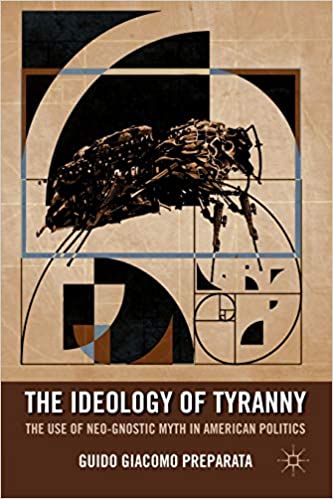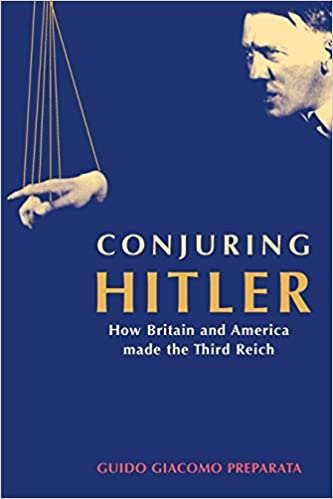What follows is a profile of a dense, polymathic thinker. Those who want some background on Guido Preparata’s ideas, and a more conversational introduction to his work, might appreciate this video interview I conducted with him. With his permission, I’ve posted it here, and you can view a list of the topics our conversation covered in the YouTube description.
Narrative and reality are becoming further and further apart on a mass scale, and it’s gonna snap at some point. And it just so happens that a lucid perception of the difference between narrative and reality is the thing that spiritual awakening is. This can happen at mass scale. [emphasis added]
Piffard, NY. So tweeted the fiercely independent and progressive Australian journalist Caitlin Johnstone on January 27th of this year. It’s a good description of our predicament (We all sense it!), and it shows a very useful, and rare, understanding of the word “spiritual.” The French novelist Stendhal said something very much the same in 1801, also a fairly chaotic time: “Almost all our misfortunes in life come from the wrong notions we have about the things that happen to us. To know men thoroughly, to judge events sanely, is, therefore, a great step towards happiness.” Both of these statements include apocalypse (the idea of “unveilings”) but also, and very importantly, hope. In other words, they are timely. Echoed in another art form, the character of the recently-widowed “Baker” in Stephen Sondheim’s Into the Woods, despairs at the challenge of raising a child in the wake of societal tumult, and the advice that he is given is golden: “Tell him the story of how it all happened. Be father and mother, you’ll know what to do.”
With what historian John Lukacs described as our evolving “historical consciousness,” (analogous to stages in individual human development where the ability to reflect on our actions increases with age), men and women during this period of change can reflect on our historical situation in a way that was not available to people at the end of the Middle Ages or the Roman Empire. The “Philosopher’s Stone,” therefore, in our time becomes the “Historian’s Stone,” and so, accordingly, the cure for our social diseases, and the catalyst for a “spiritual awakening,” is an accurate narration of our story. How did we get here? What’s actually going on? Or, to evoke the famous scene in the Garden, we can ask ourselves what God asked of Adam: “Where ARE you?” Where are WE?
For my money, the thinker with the most compelling answer to that question and, correspondingly, with the most prescient anatomy of, and prescription for, ‘these times’ in the West is Guido Preparata. Son of a famous Italian physicist and lifelong student of the classics, he brings a powerful blend of both sides of the thinking brain to his analysis. Fitting, too, that he has had teaching stints at both polytechnic universities as well as the Pontifical Gregorian University in Rome (among others). And with academic backgrounds in political economy, criminology, and economics, he brings to his criticism an acuity similar to that of Thorstein Veblen, whose works (especially his masterpiece, The Theory of the Leisure Class) inform and inspire Preparata’s own. Like Veblen, Preparata is not content to let the seemingly mundane phenomenon of prepotence (“a thirst for exploiting, bullying and bossing others around”) go unexamined in its particulars or taken for granted like we do in daily life and in most of our scholarship. In fact, like Veblen, (and like Tolstoy before him, who categorized everyday, ordinary prepotence under the title “The Law of Violence”) Preparata actually places it in the center of his work; that is, the violence, predation, and barbarism involved in our ubiquitous and taken-for-granted everyday and ordinary jockeying for position and status seeking. This is, after all, the microcosm within the macrocosm of the global mess. He writes:
The gist is the following: as long as human beings . . . will continue to evaluate, assess, and judge everything in terms of exclusivist success, victory, exploit, strength, excellence, clannishness, prestige of rank, competition, and incessant struggle for “primacy,” it will be impossible to rid ourselves of noxious hierarchies; it will be impossible to dispose of a spirit of ubiquitous and imperious prepotence which distorts every kind of human rapport: in one way or another violent, manipulative coercion and intimidation course through the entirety of our mutual (especially professional) interactions, from the most subtle and apparently harmless exchange, to the most humiliating and brutal forms of subjection. From the institutionalized exaction of usury (in our sacrosanct bank accounts) to the culminating and final “dementia” of desiring power/“high-status” pure and simple–which is the delirious end-all and be-all of human behavior. [emphasis added]
Now let’s pause right here, as we’re already at something of a crux. So far has our culture fallen into intellectual stupor and spiritual slumber that it’s the case that we actually tend to take for granted as natural, and even make foundational in our aspirations the ubiquitous predation Preparata is highlighting, both in our economic life (usury), and in our social life (“noxious hierarchies”). We quite literally structure our lives by them, and we hand this structure down to our children, gift-wrapped in familial love and with the support of all of our educational establishments and often, too, of religion. Yet foundational to Preparata’s work is the centrally discerned need of deliberately dismantling this structure brick by brick. How can we do this? “We can’t!” we are assured by most of our intellectual polestars. Jordan Peterson, for example, is one very famous public intellectual who takes for granted, builds upon, and even accepts as the driving force of progress what Preparata is looking to dismantle. Whence the divergence in outlook between the two? One need not look further than Darwin, in fact, to get the feel for these different approaches. Preparata thinks Darwinism is a religious creed, even a cult, which from the period of our infancy is handed down from parents to children in implicit fashion, but kicked into high gear, explicitly, in our years of formal education. It’s been this way for 150 years or so. This educational and cultural saturation gets us to take for granted, and even to accept as natural, violence as a driving force of history and even of aspirations seemingly directed towards the Good. The fact is, however, this modern default setting of ours undermines most all feelings of compassion, brotherhood, and peace that could lead to substantive change. This Darwinian pool in which we swim also makes Church attendance, for all too many of us, the fraud that intelligent outsiders see it as. Most Christians, many notice, specialize in prepotence like all the rest, but we gloss it over with a saccharine veneer of “nice.”
“All is religion,” said Fernando Pessoa, and Preparata quotes this often. Darwinism, applied to society, is not the science it claims to be, given that “we don’t even know where we come from,” as Preparata writes in several places. Instead, it’s what Pessoa calls a “social mystique.” It’s a story we tell ourselves–a religious story, in fact. Preparata’s physicist father, like many mathematicians, beheld an Appolonian cosmos, a harmonious order, at the level of matter. If, therefore, discord, violence, and Dionysian frenzy came after that, somewhere downstream in evolutionary history, how do we account for it? And why do we accept predatory violence with such passivity and offer it quarter? Why not work, instead, co-creating with God in this endeavor, to attempt to rid ourselves of this noxious tendency, raising our young as children of God instead of purely social creatures dutifully taught to elbow others aside on their way to the top in what we falsely discern as a zero-sum game?
One theological upshot of modernity’s intoxication with Darwinism (and prepotence), Preparata somewhat obliquely conjectures, is that, being thereby rendered tone-deaf to the cosmic, beautiful, and harmonious “music of the spheres,” our religious devotional practice may have subtly transformed into something that would surprise many of us self-proclaimed monotheists. In reverse order from the Biblical development from a tribal war God to the glorious God of All, we have fallen into practicing a devotional custom that “teaches the believer to invoke a tutelary ‘spirit,’ something like a guardian angel, as he persuades himself that he is instead in direct contact with the One,” leading to a situation described by Rudolf Steiner as a generalized state of affairs where “the most absolute polytheism” can hide behind “the mask of monotheism.”
That, I think, is the opposite of a “spiritual awakening.” In fact, the Church Fathers might even have diagnosed it as “compound ignorance.”
The Ideology of Tyranny
Jeremy Beer recently authored a very excellent piece in this forum which demonstrated a few important lacunas in the societal diagnoses of giants Philip Rieff and Christopher Lasch. For Rieff, this included his failure to discern the limit-imposing, authoritarian, and even religious nature (albeit “cloaked in rebellion and subversion” and in a form which “denies its own nature”) of the power structure gaining increasing ascendancy in what Rieff projected was to be a time of limitless and authority-less “anti-culture.” And, for Lasch, Beer discerned a misdiagnosis on the role of “spiritedness”: Not accurately foreseeing the massively “risk-averse” (i.e. fearing illness, aging, and death) nature of the new culture being formed in his time, and worried about its possibly corrosive role in questioning “nature” as such, Christopher Lasch, Beer avers, downplayed the role of spiritedness and risk, when, in fact, that is exactly what’s called for now as part of the “spiritual awakening” necessary to perceive the gap between reality and our dominant cultural narratives.
Perhaps, therefore, the best way to introduce Preparata’s masterful The Ideology of Tyranny: Bataille, Foucault, and the Postmodern Corruption of Political Dissent, is to state that Preparata takes as foundational the newly emergent authority cloaked in the “politics of diversity” that Rieff left out. And, regarding Lasch and “spiritedness,” Preparata’s book is a call to spiritedness, a disciplined spiritedness, but spiritedness all the same in its most classical form as a call to brotherhood and dissent as we “debunk the scripts.” Not coincidentally then, a collection of many of Preparata’s shorter writings online has, as an incipit, the famous lines that Rostand put in the mouth of Cyrano de Bergerac: “What are you saying? That it’s in vain? I know it. But one does not fight in the hope of success. No. It is much more beautiful when it is in vain.” Preparata also invokes the famous proclamation of Cervantes’ famous knight errant: “Too much sanity may be madness — and maddest of all, to see life as it is, and not as it should be.” Needless to say, tenured university positions have not been Preparata’s good fortune and, surprise, surprise, he didn’t last all that long at the Gregorian. Job postings of Church and State equally imply, “Spirited types need not apply.”
As a critique of political correctness and the “politics of diversity” from the Left, (and, in this, the book has affinity with Angela Nagel’s Kill All Normies), what The Ideology of Tyranny makes clear is that, if you trace it back, say, beyond Foucault, to its true roots in the earlier work of George Bataille (d. 1962), this peculiar way of thinking, this philosophy of sharp and crafty tenured radicals, actually becomes theology, but with a religious and spiritual provenance opposite to Preparata’s pantheon of more Apollonian thinkers. Bataille (a failed seminarian like another famous 20th century “social influencer”) put the modern praise of Aztec blood-letting on the map and was a Dionysian through and through; a real intellectual villain. But he was also a genius sociologist. Preparata traces how Bataille’s infatuation with the steel of the violence-forged sword of the ancient, war-loving sovereign morphs into the steel of modern, technicized, bureaucratic skyscrapers as well as the various metals of the computer, as he follows the two-pronged deployment of the “Ideology of Tyranny” in both its hyper-modern Left as well as the Neoconservative Right varieties.
In order to have a more accurate reading of this these times and the strangeness of phenomena such as men playing women’s sports and costumed insurrectionists parading through the capitol, one has to be willing to see things in a different way than we might have been taught. For Preparata, these include 1) that surplus, and not the bugbear of scarcity, is what needs to be understood as foundational in political economy, 2) that the appellation “cultural marxism” as applied to the shenanigans of political correctness confuses more than it illuminates, and 3) that the modern, mainstream Left is uber conservative (for deploying a game designed and orchestrated to upset and distract the masses and to protect the established order). What we then find out about this “politics of diversity” is that, far from being a liberal attack on conservatism, in its essentials, it is a deployment of faux-liberal rhetoric that has been weaponized to do nothing so much as to preserve, in its essentials, the status quo of the elites, doing nothing of any substance for those it claims to help, and this is by design:
It was rhetoric all right; some kind of manneristic foreplay to the habitual doublespeak of the “Liberal democracies,” which, in their ploys of international conquest and social imbalances, always come to justify imperial intrigue in the name of “freedom” and “human rights” on the one hand, and to blame economic inequality on “culture,” on the other. So PC turned out to be an argot that the middle class developed to mask its failure. . . . In brief, what was being offered was a shorthand gospel of intellectual disobedience in the name of a sentimental connivance with the downtrodden of the world. In fact, as we shall see, the true nature of this new intellectual fad was far more complex than what might have been gathered from this collection of impressions, but all in all, a sneering relativism and the profession of parlor radicalism were the immediate traits that transpired from a first casual encounter with it.
This terrain has been covered by others but by none in such depth and clarity.
Conjuring Hitler
Angrily “inspired” by the bombs that started dropping on Iraq in the wake of 9/11, Preparata, having spent years studying the 20th century financial history of Europe, including the Vatican, decided to come clean and go forth on a project that had been simmering for some time. Many of us can understand his feelings at that time, as we have seen this same game of violent overreaction (as well as people’s gullibility) play itself out a number of times since, including today as forces warring against the 1st Amendment and other freedoms in this country seem to be hitting their stride and entering their consolidation phase in a way that makes famous futuristic movie dystopias the daily news we now consume with our oatmeal in the morning. Regarding the response to 9/11:
For a day or two, timidly yet with reason, people questioned the happening, but before they all could further articulate a sensible response to it, they were swept, ravished as it were, by the civil mobilization and propagandistic regimentation of the Bush executive, which was intense, speedy and truly impressive. News—streams of combat in red sand; a monochord riff of scores to be settled by clashing civilizations; and screens zapped by holograms of beturbaned sheiks clasping AKs: a drumming so insistent that one had to march to it and believe it all. No time for an official investigation, which should have brought the culprits to justice (the “due process” of the American constitution); no time for doubts: in two weeks US troops were landed in Afghanistan—Afghanistan, of all places. . . . And whose word were we to take for the justifiability of the deployment, and the death that would have ensued? A joint declaration of George W. Bush and Britain’s PM, Tony Blair, based on no publicly available evidence—the US-UK tandem, yet again.
The story Preparata tells in his 2005 book, Conjuring Hitler: How Britain and American Made the Third Reich, shows that the Anglo-American “Great Game,” which we now see playing out in terms of “wars on terror,” color revolutions, the use of proxy warriors, destabilizations (financial and cultural), were just as operative during the two, so-called “good wars” as they have been before and since:
This extraordinary phase of our recent history is a disquieting reminder of the true nature of Anglo-American hegemony: in the course of the twentieth century, such hegemony has been extended over the surface of the globe through a potent mix of financial accounting, industrial manslaughter, and mendacious virtuosity. The routine adopted by England, and subsequently learned and perfected by the American heirs to the British Empire, is to identify a truculent and divisive political faction in his own that they wish to control; proceed to arm and finance this indigenous monster so that the war erupts in the targeted area; and finally profit from the war to achieve a variety of Imperial aims.
Both disturbing and necessary, the story is sadly familiar. Going deeper into the story, and seeing its origins, helps us to debunk future scripts in real time.
Same as it ever was. Eh? Have we had enough? As Caitlin Johnstone reminds us, spiritual awakenings 1) are a thing and 2) can happen on a mass scale. A few years ago I excitedly reviewed in this forum New Directions in Catholic Social and Political Research: Humanity vs. Hyper-Modernity, a book Preparata edited (in addition to contributing an introduction and 3 chapters), which considers how the Catholic Church could approach these times if only She summoned some vision, spiritedness, and courage. That is how I discovered Preparata’s work. Unless the leaders in Rome have done something innovative since I started writing this profile, it looks like his vision is a non-starter there: neither vision or courage have been the hallmarks of Rome’s leadership for the last many years. The Vatican’s new Council for Inclusive Capitalism, for example, at first glance (and I could be wrong!) sounds like just more of the same. It reads like the World Economic Forum’s Great Reset but maybe a bit more “nice.” The answers will not come from either of those two centers of power anyway, but from the bottom-up. Fitting with the theme of localism, Preparata and some conférés have authored “The Blueprint: A Modest Monetary and Organizational Proposal for Re-launching the Economic Welfare of Communities.” Modest and hopeful, but backed up by a lot of thought and research, it’s at least a beginning. Surrounded by lies, it’s high-time we started telling another story. Preparata’s work is seminal in that grand undertaking.















I will need to read this again, slowly when I have more time, but this jumped out at me: “Not accurately foreseeing the massively ‘risk-averse’ (i.e. fearing illness, aging, and death) nature of the new culture being formed in his time…”
Many years ago I heard the Orthodox theologian Fr. Thomas Hopko say that in Orthodox theology “original sin” is directly linked to the fear of death. He went as far as to say that in a certain sense you can argue that original sin is the fear of death. I remember not quite grasping that at the time, and I haven’t been able to trace anything that expounds on it in Hopko’s writing, or indeed in any other theologian’s (I admit that my search has been somewhat casual).
After reading Jeremy’s essay and now this, I wonder if what we’re seeing in our risk-averse society is something like a “new” manifestation of something very old — a neo-pagan recrudescence of the old pagan fear of death, prompted by the widespread rejection of the Gospel. I’ve barely thought this through, but I do wonder about it.
Also, have you read anything by Byung-Chul Han? Although at times I find him rather cryptic, I think he is onto some things about our current situation and has some very interesting things to say about it.
Hey Rob– What you’re saying is right on–a neo-pagan recrudescence of the old pagan fear of death– and if I had read that in Hopko, I would have nodded in agreement as as it strikes me as central to the Fall. I’ve been quoting scripture (1John4:18) a lot lately to highlight that “Perfect love casts out fear (not HATE)”, to get people to see that all this talk about “hate” is, by and large, a classic puritan projection onto others carried out by people who don’t want to look at their own fear, especially their fear of death. Illich is great on the modern idolatry of biological life (another formal of ‘literalism’ and lack of imagination), as a perversion of the Gospel message: one side-effect of this, it seems to me, is a massively increased fear of death which Tyranny drinks up like a Red Bull energy drink. Courage and courtesy are the ‘needful things’ at this time. Preparata has both in abundance.
I looked up Byung-Chul Han upon reading your comment at Jeremy Beer’s essay but didn’t hit “order”, only because I looked him up on A-zon. Sounds like an interesting guy; barely gives interviews, etc. I’ll order something, (He has a book on Eros!) ASAP.
Thanks, Michael. “The Fall, the Fear of Death, and the Modern” would be an interesting subject to tackle in an essay. The idea that we sin because we fear death is theologically interesting to me, but as I said, I never really followed up on it. I once brought it up in a meeting of Catholic writers/scholars, but the discussion didn’t really go anywhere largely because one fellow, apparently styling himself as the moderator, decided that it wasn’t pertinent and steered the discussion away from it. As I was a guest, I felt like I didn’t have the standing to argue otherwise.
As for Han, some people find his style problematic, in that it’s more observational than analytic. Basically, he throws observations out and comments on them, expecting the reader to connect the dots. He does very little actual “arguing.” This approach is challenging, and I find it quite fascinating; but others seem to find the lack of argument to be a real deficit. Different strokes, I guess.
Preparata looks interesting. I was struck by his emphasis on the foundational nature of violence. So is he something of a Girardian, then? Or is he coming at violence from a much different direction than Girard did?
One quibble: I don’t think that Rieff would really disagree with much that’s here. By discussing the “aesthetics of authority,” and talking about the “anti-authority” culture that rejects interdicts as such, Rieff wasn’t arguing that we’d somehow end up that Third Culture was literally without authority. He was just arguing that the nature of that authority would be based on immanent aesthetics rather than sacred and transcendent authority. So our authorities are bound, in this day and age, to be “actors” in Rieff’s idiom. Thus the dramatically intensified form of the
“throwing red meat to the base” character of contemporary democratic politics. That there’s little reason to respect such authority, be that of neoconservatives or of delusional progressives, is something that Rieff and Preparata would appear to agree on.
“He was just arguing that the nature of that authority would be based on immanent aesthetics rather than sacred and transcendent authority.”
Marion Montgomery called this a “reverse Platonism,” in which the forms come from below (i.e., autonomous human intellect) rather than above, and are declared to be true by the same human intellect that created them. Thus authority comes to be based entirely on whatever the dominant subjectivism happens to be at the time. (I don’t have the exact quote handy but could get it, if anyone’s interested.)
Correction: Montgomery’s term was “inverted” not “reverse” Platonism.
Rob:
That’s a nice way of putting it. I’ll have to remember that, and yes, I’d be interested in a reference for that quote.
Aaron
“What is effected by Nominalism, as it is appropriated out of Occam’s intricate arguments, is an instrument of power over nature justified on the authority of autonomous intellect, whereby the Platonic idea of the transcendent model is presumed a creation by autonomous intellect itself through its signs [i.e., words — M.M. makes this apparent earlier in the essay], as first divorced from but then in turn imposed upon nature. In the Christian tradition, nature is created and therefore both dependent upon and from its Creator. Hence my epithet of Modernism as an inverted Platonism, in which reality becomes dependent upon autonomous intellect itself. It follows at last from this gnostic assumption that truth itself is that which is decreed by intellect. By the power of autonomous intellect, then, such truth is made universal — according, of course, to the extent of power exercised by the particular universalizing, autonomous intellect. This is to say that a principle, subjectively authorized, becomes a dogma to be imposed as a limit against rival intellectual subjectivisms, and ideology to be established by force if necessary, providing only that there is a sufficient power for its enforcement.”
(From “Consequences in the Provinces: Ideas Have Consequences 50 Years After,” Steps Towards Restoration: The Consequences of Richard Weaver’s Ideas, Ted J. Smith III, ed.)
In this lengthy essay Montgomery, while agreeing with Weaver’s general thesis in IHC, critiques him somewhat for retaining too much Plato and not being Aristotelian enough. One need not agree with that aspect of MM’s essay to find it a worthwhile read.
Comments are closed.